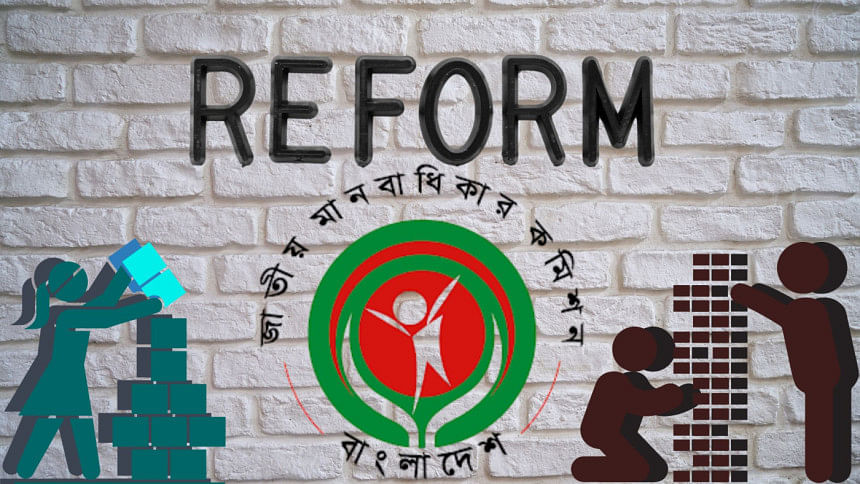Why reforming the NHRC as per the Paris Principles matters

On August 29, 2024, Bangladesh signed the UN convention on enforced disappearance, hence completing signing all nine core international human rights treaties. This step by the interim government symbolises our respect towards international human rights norms and commitment to uphold those. On several occasions, the chief adviser emphasised his government's commitment to upholding human rights and freedom of speech in the country. Among many important initiatives required to fulfil this commitment is reforming the National Human Rights Commission (NHRC) of Bangladesh, which needs immediate attention.
Due to widespread criticism of the NHRC, particularly in terms of civil and political rights, one may question the importance of the commission. However, it cannot be denied that the success or effectiveness of such an institution depends on political will, enabling environment, and the institution's leadership.
Considering discussions about crucial reforms, the NHRC staff now see a light of hope to make the organisation stronger and credible at home and abroad.
First, we need to realise the importance of an independent and credible national human rights institution (NHRI). Over the last five decades, most countries, including Bangladesh, have signed, ratified, or acceded to the major human rights treaties. When it comes to honouring their commitments to implementing the rights embodied in these instruments, many states have conspicuously failed in important respects. Moreover, development assistance has, since the end of the Cold War, increasingly been conditioned by both multilateral and bilateral donors based on respect for human rights and reforms designed to enhance good governance. NHRIs have been recognised by them as an important element in this regard.
As a matter of fact, as of April 2025, 118 countries have established NHRIs, among which 91 have A status while 27 hold B status. This accreditation is crucial for such an institution as it enhances the image of a country in the international arena, and also, fully compliant or A status NHRIs enjoy several rights and powers, such as voting power in the annual meeting of the Global Alliance of National Human Rights Institutions (GANHRI) and Universal Periodic Review (UPR), and the opportunity to become a bureau member of GANHRI.
However, it is unfortunate to note that only two NHRIs in South Asia—Bangladesh and Maldives—were awarded B status while those of India, Pakistan, Nepal, and Sri Lanka were awarded A status from the Sub-Committee on Accreditation (SCA) of GANHRI. SCA accredits the status to an NHRI based on compliance with the Paris Principles, adopted by the United Nations General Assembly in 1993. The Paris Principles provide a broad normative framework for the status, structure, mandate, composition, power, and methods of operation of the principal domestic human rights mechanism.
The Paris Principles require NHRIs to have as wide a role as possible, with two main responsibilities: human rights promotion and human rights protection.
Human rights promotion includes creating a national culture of human rights where tolerance, equality, and mutual respect thrive. Human rights protection, on the other hand, means helping to identify and investigate human rights abuses, bringing those responsible for human rights violations to justice, and providing a remedy and redress for victims. Core protection activities should focus primarily on the prevention of torture, arbitrary detention, disappearances, and the protection of human rights defenders. Linked to this is the role of NHRIs as watchdogs, reviewing conditions in detention facilities, visiting facilities unannounced and requesting private interviews with detainees. The inability to directly investigate law enforcement agencies is a critical flaw that is preventing the NHRC in Bangladesh from getting an A status, regardless of how broad its general mandate might seem on paper.
The Paris Principles require that an NHRI be provided with an appropriate level of funding in order to guarantee its independence and ability to freely determine its priorities and activities. The also require that government funding be allocated to a separate budget line item applicable only to the NHRI. India and Pakistan's NHRIs have complied with this requirement, and these NHRIs receive a parliament-approved grant. Although the NHRC Bangladesh has overcome dependency on donor budget and now fully operates with funds from the government, financial independence is still to be achieved as the commission does not receive its budget directly from parliament.
Another crucial criterion for an NHRI to be fully compliant with the Paris Principles is related to the selection and appointment of NHRI leadership. It requires the selection process to be transparent, through broad advertisement, maximising the number of potential candidates from a wide range of societal groups. The SCA recommends that NHRIs advertise vacancies and establish clear and uniform criteria upon which to assess the merit of eligible applicants. Another vital point is the long-term vacancy of NHRI leadership. In this matter, incorporating a provision in the NHRC Act on appointing alternate commissioners during the period following the resignation of a commissioner may be considered.
To move forward, it would not be an exaggeration to say that the importance of NHRC in a civilised, democratic country is undeniable. Kofi Annan in 2002 said that building strong human rights institutions at the country level is what, in the long run, will ensure that human rights are protected and advanced in a sustained manner. For long now, the NHRC and human rights defenders have been advocating for amending the NHRC Act as per the Paris Principles, arranging for a permanent space, increasing its budget, and providing lucrative service benefits to the staff. We hope that the interim government will consider reforming the commission as per the Paris Principles to make a stronger and credible NHRC that will pave the way for promoting and protecting human rights in Bangladesh, and will enhance the country's dignity in the international arena as well.
Farhana Syead is deputy director at the National Human Rights Commission Bangladesh.
Views expressed in this article are the author's own.
Follow The Daily Star Opinion on Facebook for the latest opinions, commentaries, and analyses by experts and professionals. To contribute your article or letter to The Daily Star Opinion, see our guidelines for submission.

 For all latest news, follow The Daily Star's Google News channel.
For all latest news, follow The Daily Star's Google News channel. 









Comments